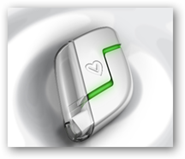This article just appeared in the Wall Street Journal, but readers here at this blog are already more than aware of connectivity with medical devices that report data, we’ve already moved on to the “Blue tooth Inhaler” here.
that report data, we’ve already moved on to the “Blue tooth Inhaler” here.
Medtronic CEO Talks About Research and Their Medical Devices for Diabetes – Video
I also talk about how the connect to HealthVault, the free PHR from Microsoft. Anyway if you are a regular reader here, you are ahead of this one.
First off though, we still need to see if those phones create cancer or not. The connectivity will stand to save a lot of money too.
Will We Ever Settle the Cell Phone/Cancer Debate – Many Medical Devices Talk to Phones
Pharma companies are working on delivery systems too that are in a patch or pump, again complete with data trails. 
The Future of Drug Delivery Lies with Technology – Panel of Experts From Cambridge Consultants
Here’s a drug for hypertension that you inhale:
FDA Approves Hypertension Drug (with Conditions) that You Inhale – Tyvaso
Here’s a blue tooth device that does glucose:
High Blood Pressure Bluetooth Remote Health Monitor, Glucose Monitor and more – Ideal Life
FDA Clears and Certifies MyGlucoHealth to Integrate with Electronic Health Records and Personal Health Records
Here’s a shirt that does Blue tooth and transmits health data:
LifeShirt Has Upgrade Coming Out With Bluetooth and Zigbee Wireless – A Shirt that Transmits Health Data
Here’s a Blue Tooth Aggregating device, it picks up from other devices and put’s it all together with one device.
FDA approves HealthPal – Bluetooth Device that Collects from Other Reporting Devices and Sends Information to PHR – HealthVault or Google Health
Companies ranging from chip maker Qualcomm Inc. (QCOM) and medical-device giant Medtronic Inc. (MDT) see an opportunity in bringing wireless connectivity to medical devices such as blood-sugar monitors and sending that information to doctors, hospitals or smartphones like Apple Inc.'s (AAPL) iPhone and Research In Motion Ltd.'s (RIMM) Blackberry.
"We're absolutely headed in that direction," said Christopher O'Connell, group president for diabetes and other device franchises at Medtronic.
Medicine is an attractive area for tech companies amid estimates the market for wirelessly relaying health-care information could grow to nearly $1 billion over the next five years, according to ABI Research analyst Stan Schatt. Diabetes is particularly appealing because it's a growing problem that already affects 7.8% of the U.S. population, according to the American Diabetes Association.
Aside from getting blood-sugar readings on smartphones, future innovations could include a Bluetooth connection for blood-sugar monitors or cellular chips within such devices to relay information right to doctors or hospitals.
Tech, Medical Device Cos Target Wireless Diabetes Monitoring - WSJ.com
Related Reading for Blue Tooth Devices



The growing use of Bluetooth and wireless technology is just what the medical industry needs. I think there is no better group of people that could use it more. It is necessary for doctors and EMTs to get the medical history and requirements of each patient as fast as possible so they can decide what is the best way to treat the patient. Germany has already been taking biggest advantage of the advances in technology, and I believe it shows.
ReplyDelete